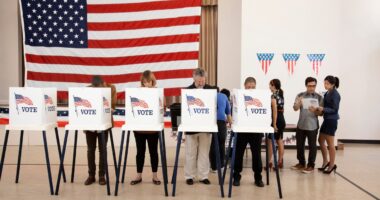As a pro-democracy activist in the hey-days of brutal military dictatorship in this country which became even more vicious after their annulment of Nige-ria’s widely acclaimed freest and fairest election that was held on June 12, 1993 and won by Chief M K O Abiola of blessed memory, I should have a reasonable idea about who was who in that struggle for which many patriots died, many more others maimed and rendered invalid both emotionally and materially just to ensure that po-litical freedom nourished by democracy reigned in this land. Unfortunately, when the democracy finally ar-rived, those who fought for it were systematically excluded from the scene by the same reaction-ary forces which they thought had earlier been vanquished on the pro-democracy battlefields. It is such an unfathomable reality that at the end, those who are actually bore the brunt and suf-fered dearly in the cause of the struggle were left in the lurch as mere onlookers. What could be more telling about the result-ing irony than the fact that, of all people, it was the same man, General Olusegun Obasanjo, who openly treated the pro-democracy movement with scorn and open disdain, who also famously said that Chief Abiola, the winner of the election on whose sacred mandate that we were rallying, “was not the Messiah” that eventually became the principal beneficiary. How undeserving! The only plausible reason why those who mid-wifed the transition processes supposedly “from the military to the civilians” in 1999 curiously opted for General Obasanjo is that it was a cal-culated move to spite the pro-democracy activists who they feared could turn the political system over to the people in the spirit of representative democracy because the idea of People’s power was scary to them. On a general note, awarding Obasanjo, a fore-most militarist, the chance to inaugurate the new Republic was both a conceptual and practical blunder as he expectedly proceeded to under-mine the fundamental essence and values of de-mocracy and constitutionalism thereby setting the stage for the lingering unconstitutional and political anarchism that is plaguing the country today. It was more like giving goats custody over yams. Of course, the democratic process quickly descended into something extremely woeful wherein election rigging, corruption, policy ar-bitrariness, nepotism and wholesale governance incompetence became the order of the day and in consequence, the nation went on a downward spiral from which she has not yet recovered leav-ing those who bravely fought for democracy to now be wondering whether this was what they fought for. As if to frontally insult the pro-democracy ac-tivists who fought under the banner proclaiming, “On June 12 We Stand”, Obasanjo, a gratuitous heir to the June 12 struggle, decided to name May 29, the day he was inaugurated, as his own “Democracy Day” thereby suggesting that end-ing direct military rule automatically means the arrival of democracy. It was therefore not a surprise that all subsequent presidents were either a former military dictator, their crony or sympathizer until the election of President Bola Ahmed Tinubu last year, who was a very prom-inent member of NADECO leadership which bravely dueled IBB, Abacha and co. to a standstill. With Bola Tinubu, many were expecting that the time for the June 12 activists who are scat-tered across the length and breadth of Nigeria has finally arrived. But looking at his “team” closely, one can only see a few individuals who were directly associated with the June 12 strug-gle still around him. That exclusionary policy has been the trend, from Obasanjo to Yar’ Adua through Jonathan to Buhari. It became obvious that most of those who fought bitterly for the de-mocracy that they have fortuitously inherited are not considered deserving for inclusion in the run-ning of the same democracy; they were pariahed! Is anyone therefore still surprised that what we are saddled with today through the instru-mentality of the 1999 Constitution is anything but a people’s democracy? It is simply illusory to expect individuals who are steeped in anti-demo-cratic culture and worldview to suddenly trans-form themselves into democrats just because they have assumed power through processes that are patently undemocratic. When in 2019 Buhari, for whatever reason, fi-nally recognised June 12 as Nigeria’s Democracy Day, I did a celebrative piece entitled “June 12 is Nigeria Authentic Democracy Day!” published on the 19th of June, 2019, to wit: “With the sign-ing into law of the Public Holiday (Amendment) Act on Monday, the 10th of June, 2019, by Pres-ident Muhammadu Buhari, which effectively abrogated the irresponsible misnomer of May 29th as Nigeria’s ‘democracy day’ and, instead, gives a legislative stamp to the historically incon-testable status of June 12 as Nigeria’s authentic Democracy Day, it can now be rightly said that the nation has finally put some closure to a very burdensome mistake. “May 29 as democracy day was always a his-torical farce; a deliberate distortion of history bordering on the ludicrous; to have pretended that May 29, the day that President Obasanjo was fortuitously sworn into office, is Nigeria’s ‘democracy day’, while ignoring the fact that it was the June 12 phenomenon that brought about the May 29 inauguration was historically unpar-donable. “Without the bitter struggles for the actual-ization of June 12, the military would never have seen the necessity to relinquish power as well as to also seek to placate the South-West region where the victim, Chief MKO Abiola, hailed from…the same Obasanjo who undeservedly benefited from the fall-outs of June 12 struggles, namely the eventual democratization of the na-tion’s political space, turned his back on Abiola. It is that catalogue of misdeeds and seemingly national memory lapses that Buhari has just rectified… “It was therefore a huge surprise when some incurable naysayers sought to fault the action of Mr. President by describing it as being politi-cal; some even sought to vitiate the noble act by shamelessly misreading the law.” “For those of us who fought those battles both in the streets and in the intellectual theatres, President Buhari finally declaring June 12 as Nigeria’s authentic Democracy Day is certainly a redemptive assurance that we didn’t struggle in vain.” Realistically viewed, however, it is also clear that beyond the symbolism of June 12 immor-talization, the unmistakable way and manner in which succeeding post-military civilian adminis-trations that benefited from that titanic struggle have snubbed June 12 veterans, dead or alive, have been anything but satisfactory. President Tinubu now has the historical op-portunity to right the wrong of the various past administrations, who enjoyed the fruits of that titanic struggle but chose to treat the real veter-ans with so much contempt. To be candid, many of those who fought for the democracy during the military dictatorship did so solely for the love of the country and were not expecting personal rewards. They were not even sure if they would survive those battles and many indeed did not survive to see the glorious day which they so gallantly strove for. But, just as the assassinated Martin Lu-ther King Jr once foretold, “I have seen the prom-ised land. I may not get there with you”, each of them certainly had similar foreboding. But an immensely grateful American society did not forget MLK as he was in due course enthroned amongst the pantheon of America’s foremost national heroes. That is what is missing in the case of Nigeria. As we celebrate this day, let us remember that it was the selfless struggle of some gallant men and women that made it possible. Tinubu should, therefore, not forget these people – in fact – his own people, in the unfolding scheme of things as the nation struggles to redirect herself unto the path leading to the true meaning of democ-racy. Nigeria should not be made to look like an ungrateful nation.
Subscribe
Login
0 Comments




